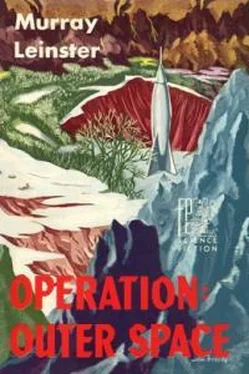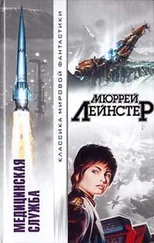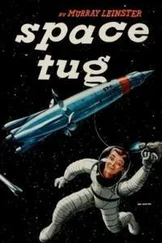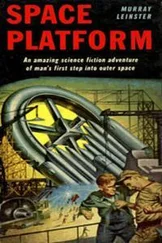Baggage came up from Earth for Johnny Simms. It was mostly elephant–guns and ammunition for them. Johnny, as the heir to innumerable millions back on earth, had had a happy life, but hardly one to give him a practical view of things. To him, star–travel meant landing on such exotic planets as the fictioneers had been writing about for a hundred years or so. He really looked upon the venture into space as a combined big–game expedition and escape from Lunar City. And he did look forward, too, to freedom from his family's legal representative and the constant reminder of ethical and moral values which Johnny preferred happily to ignore.
Film–tape came up, and cameras to use it in. Every imaginable item an expedition to space could use or even might use, was thrust upon Spaceways, Inc. Manufacturers yearned to have their products used in connection with the hottest news story in decades. There was a steady trailing of moon–jeeps from the airlocks of Lunar City to the ship.
The time of lunar sunset arrived—503:30 o'clock, half–past five hundred and three hours. Time was measured from midnight to midnight, astronomical fashion. The great, blazing sun whose streamer prominences, even, were too bright to be looked at with the naked eye—the sun neared and reached the horizon. There was no change in the star–studded sky. There were no sunset colorings. The incandescent brightness on the mountains was not lessened in the least. Only the direction of the stark black shadows shifted.
The glaring sun descended. Its motion was almost infinitely slow. Its disk was of the order of half a degree of arc, and it took a full hour to be fully obscured. And then there was at first no difference in the look of things save that the Mare Imbrium —the solidified, arid Sea of Showers—was as dark as the shadows in the mountains.
They still gleamed brightly. For a very long time the white–hot sunshine glowed on their flanks. The brightness rose and rose, and blackness followed it. At long last only the topmost peaks of the Apennines blazed luridly against a background of stars whose light seemed feeble by comparison.
Then it was night indeed. But the Earth shone forth, a half–globe of seas and clouds and continents, vast and nostalgic in the sky. And now Earthshine fell upon the moon. It was many times brighter than moonlight ever was upon the Earth. Even at lunar sunset the Earthlight was sixteen times brighter. At midnight, when the Earth was full, it would be bright enough for any activity. Actually, the human beings on Luna were nearly nocturnal in their habits, because it was easier to run moon–jeeps in frigidity and keep men and machines warm enough for functioning, than it was to protect them against the more–than–boiling heat of midday on the moon.
So the activity about the salvaged space–ship increased. There were electric lights blazing in the demi–twilight, to guide freight vehicles with their loads. The tourist–jeeps went and returned and went and returned. The last shipload of travelers from Earth wanted to see the space–craft about which all the world was talking.
Even Cochrane presently became curious. There came a time when all the paper–work connected with what had happened was done with, and conditional contracts drawn up on everything that could be foreseen. It was time for something new to happen.
Cochrane said dubiously:
"Babs, have you seen the ship?"
She shook her head.
"I think we'd better go take a look at it," said Cochrane. "Do you know, I've been acting like a damned business man! I've only been out of Lunar City three times. Once to the laboratory to talk, once to test a signal–rocket across the crater, and once when the distress–torp went off. I haven't even seen the nightclub here in the City!"
"You should," said Babs matter–of–factly. "I went once, with Doctor Holden. The dancing was marvelous!"
"Bill Holden, eh?" said Cochrane. He found himself annoyed. "Took you to the nightclub; but not to see the ship!"
"The ship's farther," explained Babs. "I could always be found at the nightclub if you needed me. I went when you were asleep."
"Damn!" said Cochrane. "Hm … You ought to get a bonus. What would you rather have, Babs, a bonus in cash or Spaceways stock?"
"I've got some stock," said Babs. "Mr. Bell—the writer, you know—got in a poker game. He was cleaned out. So I gave him all the money I had—I told you I cleared out my savings–account before we came up, I think—for half his shares."
"Either you got very badly stuck," Cochrane told her cynically, "or else you'll be so rich you won't speak to me."
"Oh, no!" said Babs warmly. "Never!"
Cochrane yawned.
"Let's get out and take a look at the ship. Maybe I can stow cargo or something, now there's no more paper–work."
Babs said with an odd calm:
"Mr. Jones wanted you out there today—in an hour, he said. I promised you'd go. I meant to mention it in time."
Cochrane did not notice her tone. He was dead–tired, as only a man can be who has driven himself at top speed for days on end over a business deal. Business deals are stimulating only in their major aspects. Most of the details are niggling, tedious, routine, and boring—and very often bear–trapped. Cochrane had done, with only Babs' help, an amount of mental labor that in the offices of Kursten, Kasten, Hopkins and Fallowe would have been divided among two vice–presidents, six lawyers, and at least twelve account executives. The work, therefore, would actually have been done by not less than twenty secretaries. But Babs and Cochrane had done it all.
In the moon–jeep on the way to the ship he felt that heavy, exhausted sense of relaxation which is not pleasurable at all. Babs annoyed him a little, too. She was late getting to the airlock, and seemed breathless when she arrived.
The moon–jeep crunched and clanked and rumbled over the gently undulating lava sea beneath its giant wheels. Babs looked zestfully out of the windows. The picture was, of course, quite incredible. In the relatively dim Earthlight the moonscape was somehow softened, and yet the impossibly jagged mountains and steep cliffsides and the razor–edged passes of monstrous stone,—these things remained daunting. It was like riding through a dream in which everything nearby seemed fey and glamorous, but the background was deathly–still and ominous.
There were the usual noises inside the jeep. The air had a metallic smell. One could detect the odors of oil, and ozone, and varnish, and plastic upholstery. There were the crunching sounds of the wheels, traveling over stone. There was the paradoxic gentleness of all the jeep's motions because of the low gravity. Cochrane even noted the extraordinary feel of an upholstered seat when one weighs only one–sixth as much as back on Earth. All his sensations were dreamlike—but he felt that headachy exhaustion that comes of overwork too long continued.
"I'll try," he said tiredly, "to see that you have some fun before you go back, Babs. You'll go back as soon as we dive off into whatever we're diving into, but you ought to get in the regular tourist stuff up here, anyhow."
Babs said nothing. Pointedly.
The moon–jeep clanked and rumbled onward. The hissing of steam was audible. The vehicle swung around a pinnacle of stone, and Cochrane saw the space–ship.
In the pale Earthlight it was singularly beautiful. It had been designed to lure investors in a now–defunct promotion. It was stream–lined, and gigantic, and it glittered like silver. It stood upright on its tail–fins, and it had lighted ports and electric lights burned in the emptiness about it. But there was only one moon–jeep at its base. A space–suited figure moved toward a dangling sling and sat in it. He rose deliberately toward an open airlock–hatch, and the other moon–jeep moved soundlessly away back toward Lunar City.
Читать дальше






